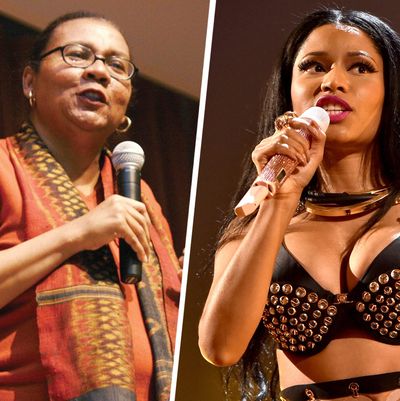
Spike Lee’s 1986 film She’s Gotta Have It follows protagonist Nola as she juggles three lovers, refusing to belong to any one man exclusively, while each grows insecure. In the film’s violent climax, one of the men asks mid-coitus, “Whose pussy is this?”
Almost 30 years later, “the pussy is old hat,” bell hooks told a room of New School students. The feminist scholar-in-residence was leading a panel — called “Whose Booty Is This?” — that put a critical lens on the butt “trend” observed by pieces in Vogue and the New York Times. According to hooks, reducing female sexuality to “the pussy” raised questions about “who possesses and who has rights in the female body.” By contrast, the booty is a more visible, PG-13 stand-in for female sexuality, easier to represent (and sell) in pop culture, but freighted with more racial connotations. A booty-centric vision of female sexuality, hooks explained, asks, “who has access to the female body?”
Indeed, some of the most accessible female bodies of the moment are black women who sing proudly about putting their ass on you: Beyoncé and Nicki Minaj. And white pop stars are increasingly following suit (Iggy Azalea, Meghan Trainor, and Miley Cyrus were mentioned), often with the help of black backup dancers, which prompts conversations about how white feminists use others’ booties to their own ends.
For those who have been following this conversation music video by music video, it can be a little exhausting. Last week, The New Republic’s Rebecca Traister argued that the feminist scrutiny facing exceptional women like Beyoncé is “unsustainable,” and could discourage other women with big ambitions. But hooks defended the critical attention. We focus on Beyoncé because Beyoncé’s the one who put the word feminist up at the VMAs, hooks explained, and because what a “liberatory sexuality” looks like is a “crisis in feminist thinking.” “I wish she were here,” hooks said. “She and I need to talk.”
hooks and Beyoncé need to talk about “Partition,” specifically. The song’s lyrics exemplify hooks’s somewhat conservative fear that feminist women might be sexually liberating themselves “against their own interests.” “If I’m a woman and I’m sucking somebody’s dick in a car and they’re coming in my mouth and we could be in one of those milk commercials or whatever, is that liberatory?” hooks asked. “Or is it part of the tropes of the existing, imperialist, white supremacist, patriarchal capitalist structure of female sexuality?”
This line of criticism tends to undermine female pop stars’ control over their own image. Didn’t Beyoncé and Minaj choose to portray their sexualities this way — and shouldn’t we take them at their word that it is liberating? “They can exercise control and make lots of money, but that doesn’t equate with liberation,” hooks countered. She believes Beyoncé’s greatest allure isn’t her good looks or even her talent, but her youth and her wealth. “There’s a lot of booties out there that are glamorous but not connected to the fantasies of wealth — and we equate wealth so much with freedom.”
hooks’s criticism of Beyoncé’s self-presentation extends to her appearance. Take her Time magazine cover, with stick-straight blonde hair.“I mean, try to imagine Beyoncé with some nappy dreads. Would she have the money that she has? Is there a kind of blackness that isn’t marketable?” Though hooks says she likes Beyoncé’s music, she would prefer everyone go look at Carrie Mae Weems’s photographs of black women instead. “I wish for black teenage girls that those images were as accessible to them as the images of pop culture that are limited in their vibrancy and are in some way a reproduction,” she said.
Unoriginality, it seems, is still a greater artistic crime than deference to the patriarchy.
“That’s one of the things that struck me about ‘Anaconda,’” she continued. “I was like, this shit is boring. What does it mean? Is there something that I’m missing that’s happening here?”




